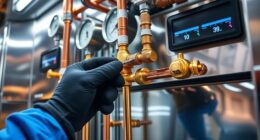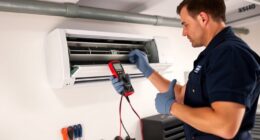Do you wonder how heat pumps move thermal energy around? We’re excited to reveal the mysteries surrounding this intriguing technology.
In this article, we will delve into the basics of thermal energy transfer in heat pumps, explore different types of heat pump systems, and uncover the mysteries of heat pump compressors and heat exchangers.
We’ll also discuss how to optimize heat pump performance and debunk common myths.
Get ready to enhance your understanding of heat pump efficiency and serve your heating and cooling needs better.

Key Takeaways
- Heat pumps transfer thermal energy from a colder region to a warmer one.
- The choice of refrigerant affects heat pump efficiency in three ways: heat transfer, compressor efficiency, and environmental impact.
- Heat pumps contribute to energy savings and have a lower carbon footprint compared to traditional heating systems.
- Regular maintenance and inspection optimize efficiency and performance of heat pumps.
The Basics of Thermal Energy Transfer in Heat Pumps
We’ll start by exploring how thermal energy is transferred in heat pumps. Understanding the principles of thermal energy transfer is crucial in comprehending how heat pumps operate efficiently.
Heat pumps work by transferring thermal energy from a colder region to a warmer one, which is achieved through the use of refrigerants. These refrigerants absorb heat from the colder space and release it into the warmer space. The process involves a series of stages, including compression, condensation, expansion, and evaporation.
To ensure optimal efficiency, insulation plays a vital role. Proper insulation prevents unnecessary heat loss or gain, allowing the heat pump to maintain the desired temperature effectively. Insulation materials such as foam, fiberglass, or cellulose are commonly used to limit heat transfer through walls, floors, and ceilings.
Understanding the Role of Refrigerants in Heat Pump Efficiency
Refrigerants play a crucial role in optimizing heat pump efficiency by facilitating the transfer of thermal energy. The choice of refrigerant can have a significant impact on the overall performance of a heat pump system. Here are three key ways in which the role of refrigerants affects heat pump efficiency:

-
Heat Transfer: The refrigerant is responsible for absorbing heat from a low-temperature source and releasing it to a higher-temperature sink. The specific heat capacity and thermal conductivity of the refrigerant determine how efficiently it can transfer heat.
-
Compressor Efficiency: The refrigerant properties also affect the efficiency of the compressor, which compresses the refrigerant to increase its temperature and pressure. The refrigerant’s thermodynamic properties, such as vapor pressure and enthalpy, influence the compressor’s energy consumption.
-
Environmental Impact: The choice of refrigerant can have environmental consequences. Some refrigerants, such as chlorofluorocarbons (CFCs) and hydrochlorofluorocarbons (HCFCs), contribute to ozone depletion and global warming. Opting for environmentally friendly refrigerants, such as hydrofluorocarbons (HFCs) or natural refrigerants like carbon dioxide (CO2) or ammonia (NH3), can reduce the heat pump’s carbon footprint.
Understanding the role of refrigerants and the impact of refrigerant choice is essential for maximizing heat pump efficiency and minimizing environmental harm.

Exploring the Different Types of Heat Pump Systems
When it comes to heat pump systems, understanding their efficiency and environmental benefits is crucial.
Heat pumps are known for their ability to transfer thermal energy efficiently, making them highly efficient heating and cooling solutions for homes and businesses.
Additionally, heat pumps have a lower carbon footprint compared to traditional heating systems, as they rely on renewable energy sources like air, water, or the ground.
Exploring the different types of heat pump systems allows us to identify the most suitable option for specific needs, maximizing energy savings and minimizing environmental impact.
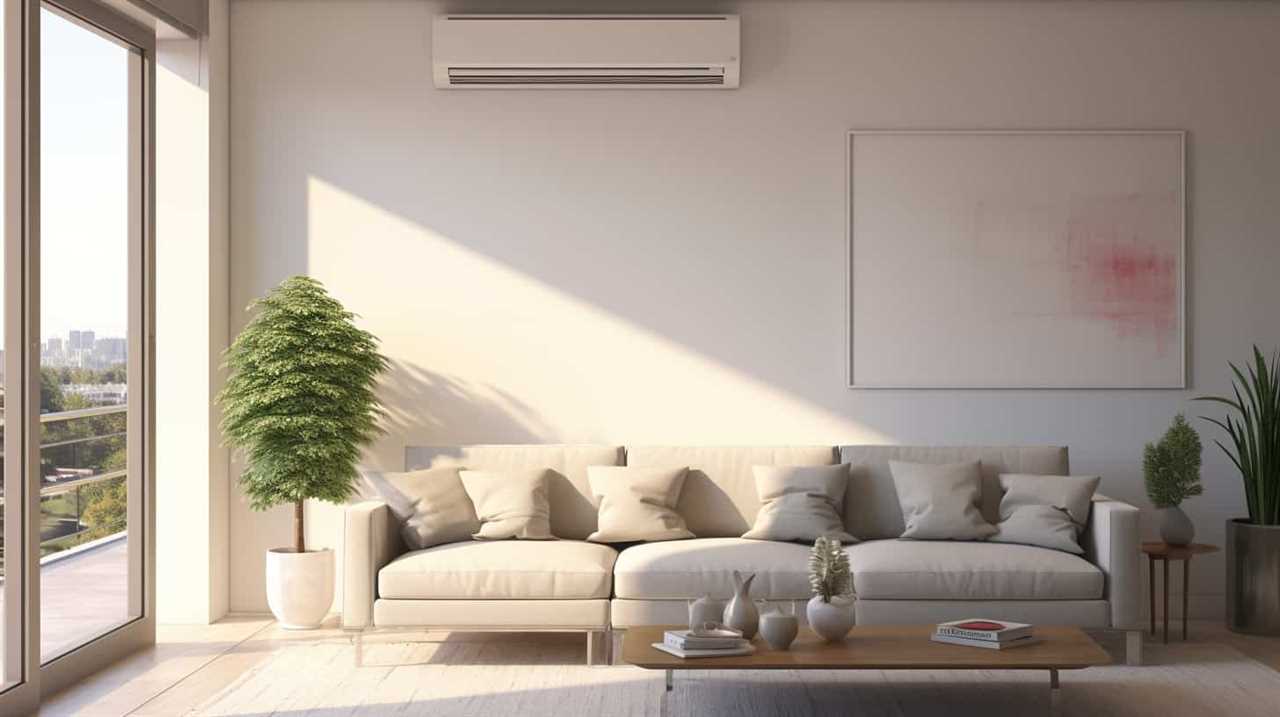
Efficiency of Heat Pumps
Exploring the various types of heat pump systems allows us to assess their efficiency. When it comes to improving efficiency and reducing energy consumption, heat pumps offer several options.
Here are three types of heat pump systems that can help achieve these goals:
-
Air source heat pumps: These systems extract heat from the outside air and transfer it indoors, providing efficient heating during colder months. They can also be reversed to provide cooling during warmer months.
-
Ground source heat pumps: By utilizing the constant temperature of the ground, these systems provide highly efficient heating and cooling. They can be installed vertically or horizontally, depending on the available space.

-
Water source heat pumps: These systems extract heat from a water source, such as a lake or a well, to provide heating and cooling. They’re particularly efficient in areas with a reliable water source.
Environmental Benefits of Heat Pumps
We frequently experience the environmental benefits of heat pumps by utilizing different types of heat pump systems. Heat pumps offer several advantages over traditional heating and cooling systems, resulting in a reduced environmental impact.
One of the key benefits is their energy efficiency. Heat pumps are capable of transferring heat from one place to another, rather than generating heat by burning fossil fuels. This leads to lower greenhouse gas emissions and contributes to the reduction of air pollution.
Additionally, heat pumps can be powered by renewable energy sources such as solar or geothermal energy, further reducing their environmental impact.

Uncovering the Secrets of Heat Pump Compressors
When it comes to heat pump compressors, understanding their efficiency and performance is crucial for optimal operation. Compressors play a key role in the heat transfer process, and their efficiency directly impacts the overall performance of the heat pump system.
Regular maintenance of the compressors is also essential to ensure their longevity and prevent costly breakdowns. In this section, we’ll delve into the secrets of heat pump compressors, exploring their efficiency, performance, and providing useful maintenance tips.
Compressor Efficiency and Performance
To understand the secrets of heat pump compressors, we need to examine their efficiency and performance. The efficiency of a compressor is determined by its design and plays a crucial role in the overall energy consumption of the heat pump system. Here are three key factors that contribute to compressor efficiency and performance:
-
Compressor Design: The design of the compressor affects its ability to compress the refrigerant efficiently. Factors such as the type of compressor, the size of the compressor, and the materials used in its construction can all impact its efficiency.
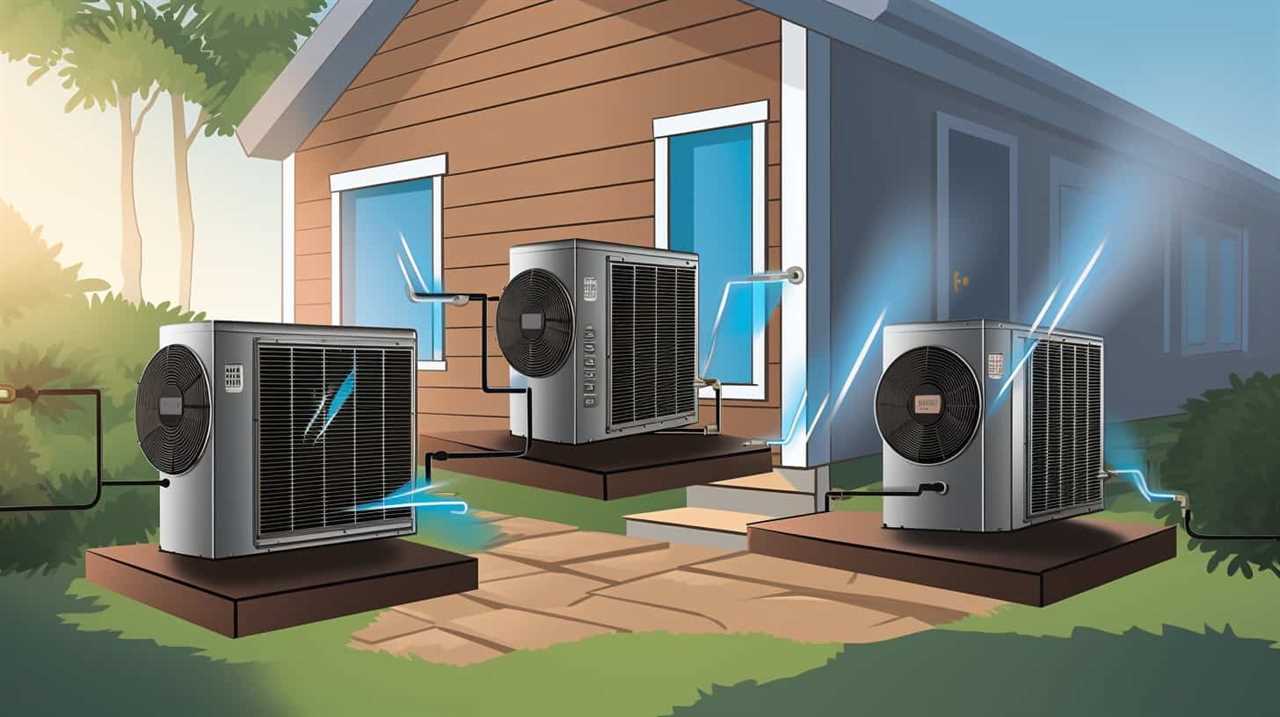
-
Energy Consumption: The energy consumption of a compressor is influenced by its operating conditions, such as the temperature and pressure of the refrigerant. Optimizing these conditions can help improve the efficiency and performance of the compressor, resulting in lower energy consumption.
-
Maintenance: Regular maintenance and proper lubrication of the compressor are essential to ensure its optimal performance. Cleaning or replacing filters, checking for leaks, and ensuring proper refrigerant levels can all contribute to improved efficiency and performance.
Maintenance Tips for Compressors
Regular maintenance and proper care are essential for maintaining the optimal performance of heat pump compressors. To ensure the longevity and efficiency of your compressor, it’s important to follow a compressor maintenance checklist.
First, regularly inspect the compressor for any signs of wear or damage.

Second, clean the compressor coils and fins to remove any dirt or debris. This will help improve airflow and prevent overheating.
Third, check the refrigerant levels and ensure they’re at the recommended levels. Low refrigerant levels can cause the compressor to work harder and lead to decreased performance.
Lastly, if you encounter any issues with your compressor, such as unusual noises or reduced cooling capacity, it’s important to perform compressor troubleshooting to identify and address the problem promptly.
Investigating Heat Exchangers in Heat Pump Technology
We examine how heat exchangers play a crucial role in the functioning of heat pump technology. Heat exchangers are responsible for transferring thermal energy between the indoor and outdoor environments. They’re made of various materials, including copper, aluminum, and stainless steel, which are chosen for their excellent heat conductivity and durability.

Heat exchangers work by circulating a refrigerant that absorbs heat from the indoor air and releases it outside, or vice versa, depending on whether the heat pump is in heating or cooling mode.
Troubleshooting heat exchangers involves checking for leaks, cleaning or replacing filters, and ensuring proper airflow. Regular maintenance and inspection of heat exchangers are essential to optimize the efficiency and performance of heat pump systems, ensuring comfort and energy savings for homeowners.
Optimizing Heat Pump Performance Through Thermostats and Controls
Our thermostats and controls are key components in optimizing the performance of heat pumps. By implementing thermostat optimization and control strategies, we can ensure that heat pumps operate at their highest efficiency levels.
Thermostat optimization involves setting the temperature and operating modes to meet the occupants’ comfort needs while minimizing energy consumption. This can be achieved through programmable thermostats that allow for customized temperature schedules based on occupancy patterns.

Additionally, control strategies such as demand response and variable speed technology can further enhance performance by adjusting the heat pump’s operation based on external factors and load requirements.
By utilizing these advanced control techniques, we can maximize the energy efficiency of heat pumps while still providing optimal comfort.
Now, let’s move on to debunking common myths about heat pump efficiency.
Debunking Common Myths About Heat Pump Efficiency
Let’s debunk some common myths about the efficiency of heat pumps. There are several misconceptions that often lead people to believe that heat pumps aren’t as efficient as they actually are. Here are three energy-saving tips that will help dispel these myths:
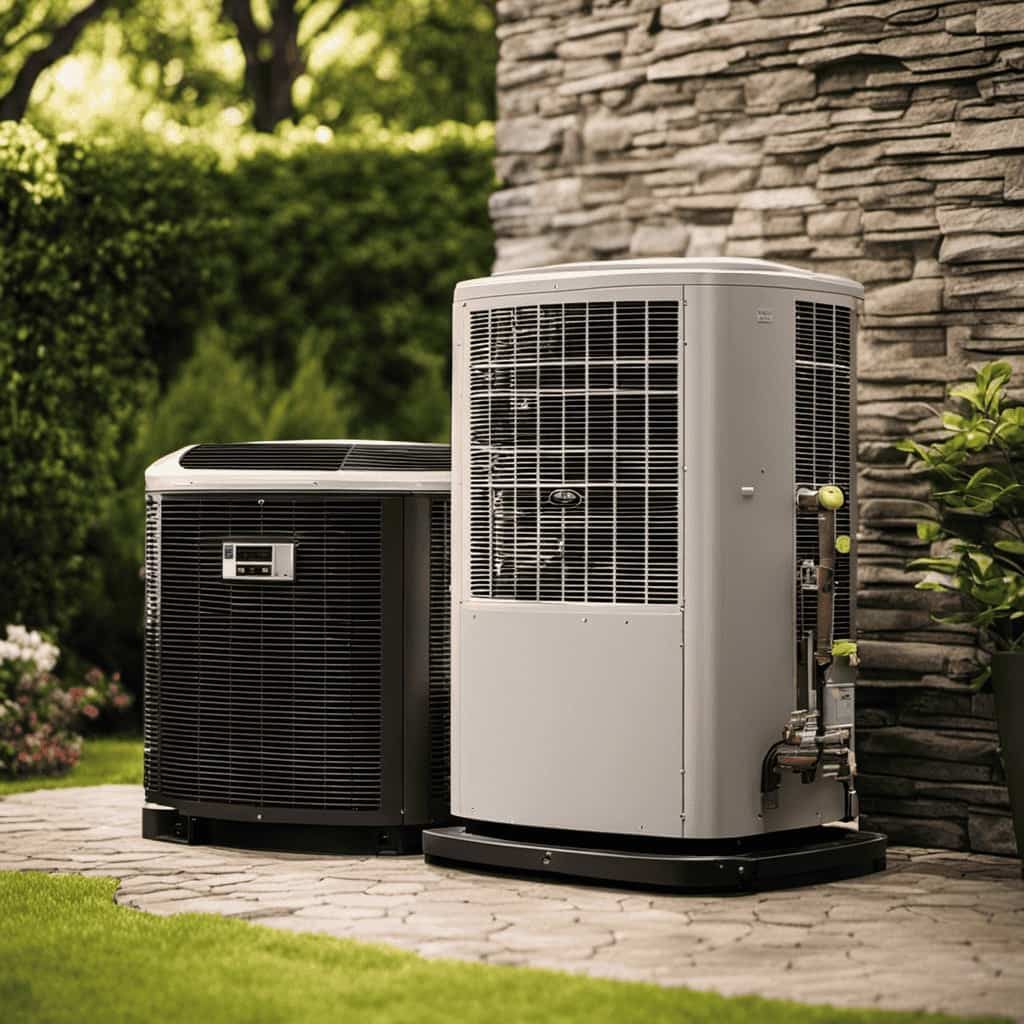
- Myth: Heat pumps aren’t effective in cold climates.
- Fact: Heat pumps can still efficiently heat homes even in freezing temperatures. With advancements in technology, modern heat pumps can operate effectively in cold climates.
- Myth: Heat pumps consume a lot of electricity.
- Fact: Heat pumps are actually highly efficient in terms of energy consumption. They transfer heat rather than generate it, making them more energy-efficient than traditional heating systems.
- Myth: Heat pumps are expensive to install.
- Fact: While the initial cost of installing a heat pump can be higher compared to other heating systems, they provide long-term energy savings that can offset the initial investment.
Enhancing Heat Pump Efficiency With Regular Maintenance and Upgrades
Regular maintenance and upgrades can significantly enhance the efficiency of heat pumps. By regularly inspecting and cleaning the various components of the heat pump system, such as the evaporator coil, condenser coil, and air filters, any issues can be identified and resolved promptly. This ensures that the heat pump operates at its optimal capacity and efficiency.
Additionally, upgrading components such as the compressor, fan motor, and refrigerant can further maximize efficiency. Upgrading to more advanced and energy-efficient technologies can also provide significant improvements in heat pump performance.
Regular maintenance and upgrades not only extend the lifespan of the heat pump but also reduce energy consumption and lower operating costs. It’s essential to consult with a professional technician to ensure that the maintenance and upgrades are performed correctly and in accordance with the manufacturer’s guidelines.
Frequently Asked Questions
How Much Does a Heat Pump System Cost to Install?
When considering the cost of installing a heat pump system, there are various factors to take into account. These include the size of the system, the complexity of the installation process, and any additional components or modifications required.
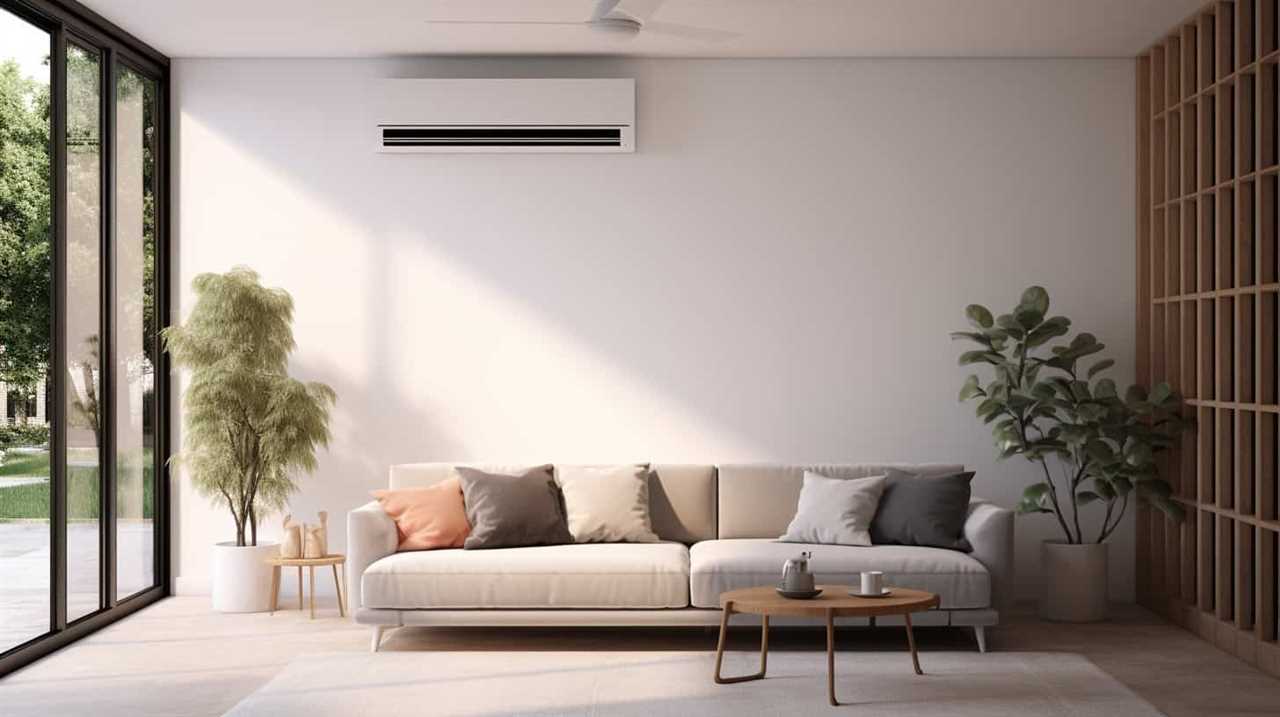
Can a Heat Pump System Be Used in Extreme Climates?
Yes, a heat pump system can be used in extreme climates. Despite some reduction in efficiency, modern heat pumps are designed to operate efficiently in a wide range of temperatures, providing energy savings and comfort.
Are There Any Subsidies or Tax Credits Available for Heat Pump Installations?
Yes, there are subsidies and tax credits available for heat pump installations. These financial incentives can help offset the initial cost of the system, making it more affordable and encouraging its adoption.
How Long Does a Heat Pump System Typically Last?
Heat pump systems typically last around 15-20 years with proper heat pump maintenance. Signs of heat pump failure include decreased heating or cooling performance, strange noises, and increased energy bills.
Can a Heat Pump System Be Used for Both Heating and Cooling Purposes?
Yes, a heat pump system can be used for both heating and cooling purposes. It offers high heat pump efficiency and has several advantages, such as cost savings and environmental friendliness, making it an ideal choice for serving others.

Conclusion
In conclusion, the secrets of heat pumps’ thermal energy transfer have been unveiled, revealing a remarkable level of efficiency and performance. With cutting-edge technology, advanced refrigerants, and optimized components such as compressors and heat exchangers, heat pumps have revolutionized the way we heat and cool our spaces.
By debunking common myths and emphasizing the importance of regular maintenance and upgrades, we can maximize the efficiency of these incredible systems, creating a comfortable and sustainable environment like never before.







